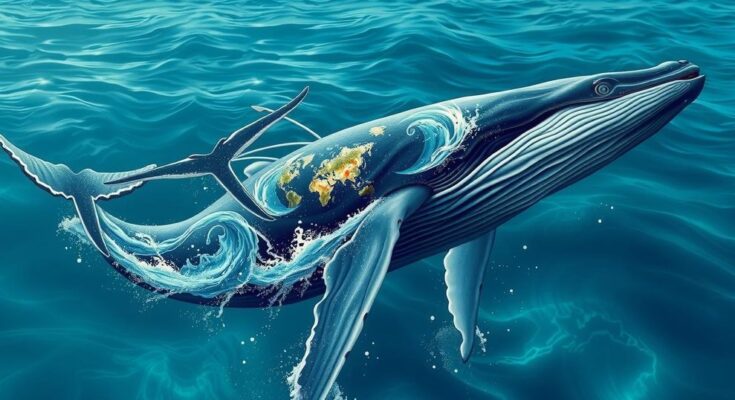A male humpback whale has completed a remarkable migration of over 8,000 miles, marking a new record for its species. This journey, which began in 2017 and culminated in 2022 with a sighting near Zanzibar, may be driven by environmental changes affecting food availability, particularly krill. Scientists express concern that such migratory shifts highlight the impact of climate change on marine ecosystems, emphasizing the need for further study and adaptation by oceanic species.
A male humpback whale has recently achieved the remarkable feat of completing one of the longest migrations ever documented in its species, traveling over 8,000 miles (approximately 13,000 kilometers) across vast marine territories. This incredible journey began in 2017 when the whale was first observed off the Colombian coast. Over the years, it was spotted multiple times in the Pacific Ocean; however, in 2022, the whale was sighted near Zanzibar, located off the Tanzanian coast in the Indian Ocean, marking a significant and unprecedented transoceanic trip.
This unusual migration has left scientists, including Ekaterina Kalashnikova from the Tanzanian Cetacean Program, in awe. Kalashnikova noted, “This migration is really impressive and unusual, even for this highly migratory species.” The noticeable shift in the whale’s travel pattern is hypothesized to be a response to environmental changes, especially concerning the availability of food sources such as krill, important for their sustenance. Recent studies indicate that rising ocean temperatures have adversely impacted krill populations, prompting the whale to seek new foraging grounds.
Several theories have been proposed regarding this migration, including the search for alternative feeding grounds due to the depletion of krill, exploration of new breeding habitats in light of whale population recovery, and a possible shift in migratory patterns influenced by increased competition among males associated with a growing population.
The alteration in migratory routes by humpback whales serves as a reflection of the rapid changes occurring in our climate. These remarkable mammals are traditionally known for their extensive migrations between warmer breeding grounds and colder feeding habitats. As they adapt their journeys in response to decreasing krill availability, it signals profound transformations within marine ecosystems.
Climate change presents several challenges, including altered natural habitats as a result of rising temperatures, shifts in feeding grounds, and the impact of extreme weather events on established migratory routes. It is essential to note that humpbacks are not isolated in their adaptive behaviors; various cetacean species, including dolphins, are also adapting to changing environmental conditions, although this may heighten the pressures on marine populations.
Dr. Kalashnikova elucidates, “The exact reasons remain unclear, but among the possible factors are global changes in climate, extreme environmental events (which are becoming more frequent), and evolutionary mechanisms specific to the species.” Consequently, the long-distance journey of this humpback whale encapsulates the intricate relationship between climate dynamics and marine life, underscoring the important need to monitor these developments closely.
The migration patterns of humpback whales demonstrate their response to environmental changes, particularly in the context of climate change and its impacts on food sources such as krill. As these marine mammals are predominantly known for their extensive migratory behavior between breeding and feeding grounds, shifts in their patterns reveal critical insights about the health of the marine ecosystem and the broader implications of climate change on marine biodiversity. The significance of this specific migration underscores the urgency of understanding and addressing climate-related challenges facing marine life.
In summary, the record-breaking migration of a male humpback whale across more than 8,000 miles serves as a compelling indicator of the broader environmental changes driven by climate change. The responses of these whales to shifting food sources and changing habitats underscore the necessity for ongoing research and conservation efforts to address the impacts of global warming on marine ecosystems. The adaptations observed in this species may offer critical insights into the health of our oceans and the need for effective stewardship in the face of rapid climatic shifts.
Original Source: dailygalaxy.com




